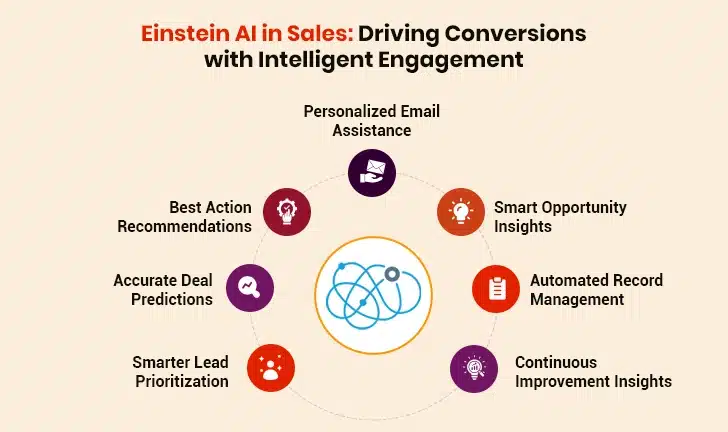Think about calling customer support and getting quick, helpful answers every time. Now imagine if that same support could also suggest useful products or services without being pushy. That’s exactly what Einstein AI agents do. They make customer interactions smarter and more personal.
Traditionally, customer service was limited to fixing problems. But now, businesses also want to understand what customers need and offer the right solutions at the right time. Einstein AI agents learn from every interaction and can suggest solutions, recommend products, or even predict what a customer might need next.
This shift from just solving issues to also helping with sales makes customer interactions more meaningful. In this article, we’ll see how businesses use Einstein AI from service to sales to build better customer relationships and boost sales performance. Let’s get started.

Table of Contents
Salesforce Einstein AI in Service: Enhancing Customer Support and Satisfaction
Einstein AI in Sales: Driving Conversions with Intelligent Engagement
Challenges and Considerations of Salesforce Einstein AI
The Future of AI-Powered Customer Engagement
Salesforce Einstein AI in Service: Enhancing Customer Support and Satisfaction
Salesforce Einstein AI helps support teams to work smarter. It understands customer needs quickly to provide better, faster help. This technology makes service smoother for both agents and customers. Here’s how it improves everyday support experiences.
1. Faster Answers to Common Questions
Einstein AI powers chatbots that answer basic customer questions right away. When customers ask about order status or return policies, the chatbot replies instantly with accurate information. It learns from past conversations to improve its answers over time. This means shorter wait times for customers looking for instant help. Customers enjoy faster service without phone calls or long email waits, and agents have more time for complex cases that need human assistance. The chatbot also works 24/7, so customers can get help anytime, even outside business hours. Fast answers lead to happier customers who don’t get frustrated waiting.
“Einstein Bots are revolutionizing service by handling routine queries, allowing agents to tackle complex issues.” – Bill Patterson, EVP and GM of CRM Applications at Salesforce

2. Smarter Case Routing
Salesforce AI automatically sends each support ticket to the best agent. It reads the customer’s problem and matches it to agents who solved similar issues before. As a result, specialists get cases in their area of expertise. Not only this, customers connect with someone who understands their pain points immediately. No more frustrating transfers between departments. The right agent starts helping from the first contact. This reduces resolution time and improves first-contact solutions. Both customers and agents save a significant amount of time.
3. Helpful Agent Suggestions
While agents work on cases, Salesforce AI Einstein shows them solutions that work for similar problems. It displays relevant knowledge articles and past successful resolutions. Agents see these helpful tips right on their screen as they work. They invest less time looking for answers and more time aiding customers. The suggestions improve accuracy and consistency in responses. New agents especially benefit from this guided help. As a result, customers get reliable answers faster from better-supported agents.
4. Spotting Urgent Issues Early
Einstein notices warning signs in customer cases before they escalate. It detects frustrated customers, repeating problems, or high-priority issues automatically. The system alerts supervisors about cases needing immediate attention. This enables teams to intervene before small frustrations become big complaints. As a result, critical situations get prioritized in the queue. This proactive approach prevents many bad experiences from happening. Furthermore, support becomes more thoughtful than reactive.
5. Personalized Support Experience
Einstein remembers each customer’s history and preferences. When customers contact support, Einstein AI agents see their past purchases, previous issues, and preferences immediately. Owing to this, customers don’t need to recall their issue every time they call. The system can even greet them by name and reference past interactions. This makes customers feel valued as individuals rather than just ticket numbers. Einstein AI agents provide more relevant help since they understand the full context. As a result, customers spend less time explaining and more time getting their problems solved. Personal touches like these improve customer satisfaction.
6. Automatic Case Updates
Salesforce AI keeps customers informed without agent effort. When their case status changes like when an agent starts working on it or when a solution is found, Salesforce AI Einstein sends automatic updates. As a result, customers always know what’s happening with their request through email or text. This reduces repeat calls asking, “What’s the status?” Furthermore, agents save significant time they’d spend on providing updates manually. Customers also appreciate being kept in the loop without having to ask. Not to mention, clear communication builds trust in your support process.
7. Learning from Every Interaction
After each support case closes, Salesforce AI Einstein studies what worked best. It looks at which solutions satisfied customers fastest. The AI notices patterns in successful resolutions. Over time, it gets better at suggesting these proven solutions first. The system continuously improves by learning from every agent’s experience. What works for one agent becomes knowledge for the whole team. This means customers get consistently good help that keeps getting better.
Getting Smarter Insights from Your CRM System: Embracing Salesforce Einstein
Einstein AI in Sales: Driving Conversions with Intelligent Engagement
Einstein AI acts like an additional team member who never sleeps. It constantly reviews your sales data to identify the best opportunities to engage customers. Here’s how this technology helps your team close more deals daily with less effort.

I. Smarter Lead Prioritization
Einstein AI analyzes all your leads and sorts them by who’s most ready to buy. It checks aspects like how often they visit your website, what emails they open, and if they match your best past customers. The system then gives each lead a score showing how hot they are. Salespeople can focus first on the highest-scoring leads instead of guessing who might buy. This saves time and helps close more deals faster. Salesforce Einstein AI keeps updating scores as leads take new actions, so the list always stays current.
II. Accurate Deal Predictions
Salesforce AI studies your past sales data to predict how existing deals will go. It looks at deal size, how long similar deals took, and how much contact you’ve had with the customer. Then it estimates the chance each deal will close successfully. These predictions help managers plan better and spot deals that might require extra help. Sales teams can see which opportunities are most likely to happen this month. The system gets smarter over time as it learns from more of your sales.
III. Best Action Recommendations
Einstein AI suggests the most useful actions for each sales opportunity. It might say, “Send pricing info now” or “Schedule a product demo.” These tips come from seeing what worked for similar customers in the past. Salespeople get helpful reminders so they don’t forget important steps. Salesforce Einstein AI also recommends the best times to contact each lead for better responses. These smart suggestions help move deals forward quickly and more smoothly.
IV. Personalized Email Assistance
Salesforce Einstein AI helps write better sales emails that get replies. It suggests subject lines that get opened and content that matches each customer’s interests. Based on past successful emails, it can even draft complete messages. The system recommends the best times to send emails for each contact. This helps salespeople save hours while sending more effective communications. Customers also get relevant messages instead of generic ones. This personal touch makes prospects more likely to respond and move forward in the sales process.
V. Smart Opportunity Insights
Salesforce AI Einstein spots potential problems in deals before they occur. It notices when customer engagement drops or key decision-makers haven’t been contacted. The system alerts sales teams about risks like deals that might stall or go to competitors. These early warnings give sales reps time to fix issues. Salesforce Einstein AI also highlights which opportunities need immediate attention. Instead of finding out too late, salespeople can take action while there’s still time to save the deal. These insights help teams focus on what matters most right now.
“Einstein Opportunity Insights helps sales reps prioritize deals with the highest likelihood to close.” – Sarah Franklin, President & chairwoman advisory at Salesforce.
VI. Automated Record Management
Einstein AI automatically updates customer records in Salesforce. When salespeople make calls or send emails, the system logs these activities without manual entry. It pulls important details from conversations and adds them to the right contact records. This keeps information accurate and up-to-date. Owing to this, sales reps spend less time inputting data and more time in selling. Furthermore, managers get better visibility into team activities. Customers receive more consistent service since all their details are current. The system works quietly in the background, making sure no important information gets missed or forgotten.
VII. Continuous Improvement Insights
Salesforce AI learns from every successful and unsuccessful deal. It identifies which sales approaches work best for different customers. These insights help the whole sales team improve gradually. Managers see which techniques get results and where coaching is needed. The system spots patterns humans might miss, like which product demos lead to the fastest closes. Salespeople get personalized tips based on their own performance. As more deals happen, the suggestions get even better. This constant learning means the sales process keeps improving, helping teams close more deals with less effort.
How Salesforce Einstein Analytics Powers Smarter Business Decisions
Components of Einstein AI
What makes Einstein AI so useful? It’s the combination of these essential components that allows the system to learn from information and offer practical guidance for everyday business decisions.
1. Einstein Analytics
- Einstein Discovery: Analyzes data to predict outcomes and recommend actions
- Einstein Dashboards: AI dashboards with automated insights
- Einstein Next Best Action: Recommends optimal actions for sales, service, or marketing
2. Einstein for Sales
- Einstein Opportunity Insights: Predicts deal risks and suggests next steps
- Einstein Activity Capture: Automatically logs emails and meetings in Salesforce
- Einstein Forecasting: Uses AI to improve sales forecasting accuracy
- Einstein Conversation Insights: Analyzes sales calls for key trends and coaching opportunities
3. Einstein for Service
- Einstein Case Classification: Automatically categorizes support cases
- Einstein Case Routing: Directs cases to the best-suited agent
- Einstein Reply Recommendations: Suggests responses to customer inquiries
- Einstein Bots: AI-powered chatbots for automated customer service
4. Einstein for Marketing
- Einstein Engagement Scoring: Predicts customer engagement likelihood
- Einstein Send Time Optimization: Recommends the best time to send emails
- Einstein Content Selection: Personalizes content for different audiences
- Einstein Attribution: Measures marketing campaign effectiveness
5. Einstein for Commerce (B2B & B2C)
- Einstein Product Recommendations: AI-driven personalized product suggestions
- Einstein Search Recommendations: Enhances search results in e-commerce
6. Einstein for Developers & Admins
- Einstein Platform Services: Allows custom AI model building using Salesforce data
- Einstein Language & Vision: APIs for natural language processing (NLP) and image recognition
- Einstein Prediction Builder: No-code tool to create custom predictive models
7. Einstein Copilot (Generative AI Features)
- AI Chat Assistant: Helps users get insights, generate content, and automate tasks
- Einstein GPT: Generative AI for creating emails, reports, and knowledge articles
- Einstein Trust Layer: Ensures data privacy and security in AI-generated outputs
8. Einstein Data & AI Infrastructure
- Einstein Vector Database: Stores embeddings for AI model training
- Einstein Model Metrics: Monitors AI model performance
Unlock AI-Powered Growth with Salesforce Einstein
Challenges and Considerations of Salesforce Einstein AI
Salesforce Einstein AI is powerful, but using it effectively requires some thought. These points highlight what to consider so you can make the most of what it offers without running into unnecessary problems.
I. Data Quality Matters
Einstein AI works best with good, clean data. If your customer information has mistakes, duplicates, or missing details, the AI might give the wrong suggestions. Messy data leads to poor predictions that won’t help your business.
Solution: Before using Einstein, clean up your data. Remove duplicate contacts and fix errors like wrong email addresses. Fill in missing information where possible. Set up rules to keep data clean going forward. Regular checkups prevent old problems from returning. Good data helps Einstein give accurate, useful recommendations.
II. Employees May Resist Change
Some workers might not want to use AI suggestions. They may think the computer doesn’t understand their job or fear it will replace them. This resistance can stop your team from benefiting from Einstein’s help.
Solution: Show employees how Einstein makes their jobs easier, not harder. Start with small tasks where AI helps, like sorting important emails. Let staff see real-world examples of how Einstein AI saves time. Training and patience help people get comfortable with the new tools.
III. Setup Takes Time
Einstein doesn’t work perfectly right away. It needs proper setup and comprehensive training to understand your business. Rushing this process leads to poor results and frustration.
Solution: Plan for enough setup time. Work with Salesforce experts if needed. Test Einstein with a small group first to work out problems. Slowly expand as the system learns your business patterns. Proper setup prevents headaches later.
IV. Costs Can Add Up
Einstein AI has different features that cost extra money. Some businesses might pay for tools they don’t use. The expenses can surprise companies that didn’t plan for them.
Solution: Start with just the basic AI features you need. Track how much you’re using each tool. Only add more features when you’re sure they’ll help. Compare costs against the time or money you are saving. Plan your budget to include AI expenses.
V. Needs Ongoing Care
Salesforce Einstein AI doesn’t work perfectly forever without help. As your business changes, Salesforce AI needs updates. Without regular checks, it might give old or wrong suggestions.
Solution: Have someone who can check the AI’s work regularly. Update its settings when your products or services change. Fix any problems quickly. Educate new employees on how to use it properly. Small, regular updates keep Salesforce Einstein AI helpful.
The Future of AI-Powered Customer Engagement
AI is making customer service better, faster, and more helpful. Tools like Einstein AI learn from every interaction to give better responses over time. They handle simple questions quickly, so human agents can focus on tougher problems.
Soon, these AI systems will get even smarter. They will better understand what customers need before they ask. This means faster solutions and more personal service. As a result, businesses will save time while customers get better help. The result will be quicker answers, happier customers, and stronger relationships between customers and companies.
Top Use Cases of Salesforce Einstein AI
Use Cases of Einstein AI Across Industries
Einstein AI works differently depending on the business. These real-world cases demonstrate how Einstein AI helps different industries work smarter, whether they are selling products or serving customers.
| Industry | What It Does | How It Helps |
|---|---|---|
| Financial Services | Predictive analytics for credit risk, fraud detection, portfolio analysis | Flags potential risks in credit assessments and loans, detects fraud early, and provides market insights for better investment decisions. |
| Manufacturing | Supply chain optimization, predictive maintenance, quality control, sustainability monitoring | Predicts supply chain disruptions, forecasts equipment failures to reduce downtime, improves product quality, and supports environmental compliance |
| Sales & Marketing | Predictive lead scoring, automated lead routing, campaign optimization, customer behavior insights | Prioritizes leads, routes them efficiently, optimizes marketing campaigns with engagement scoring, and personalizes customer interactions |
| Customer Service | AI chatbots, case classification and routing, automated follow-ups | Provides 24/7 automated support, routes cases to the right agents, predicts case outcomes, and automates customer follow-ups to improve satisfaction |
| Retail & ecommerce | Personalized marketing, demand forecasting, inventory optimization, automated customer service | Delivers tailored product recommendations, optimizes stock levels to reduce waste, automates customer support via chatbots, and enhances loyalty programs |
Summing Up
Einstein AI agents are changing how businesses interact with customers. What started as simple help tools are now smart assistants that understand customers’ needs and suggest solutions. They make customer service faster while creating opportunities for meaningful sales – all without being pushy.
The real strength of these AI agents is how they learn. Every conversation makes these agents better at providing the right answers and spotting real needs. Companies that use Salesforce Einstein analytics solutions won’t just solve problems but also build stronger customer relationships. If you also want to harness the potential of Einstein AI agents, you may seek consultation from certified Salesforce partners.





